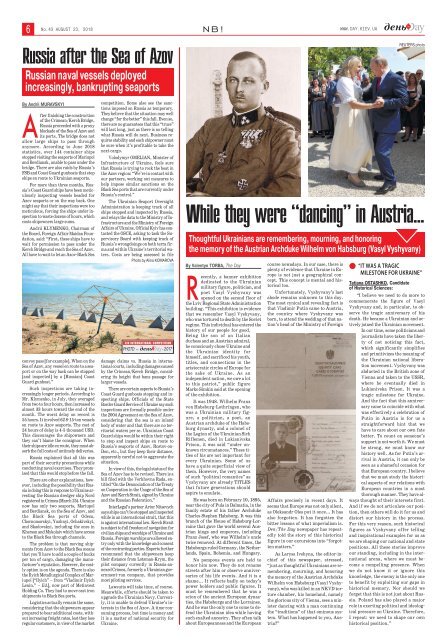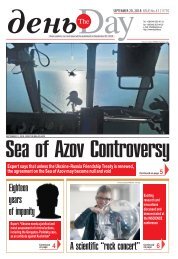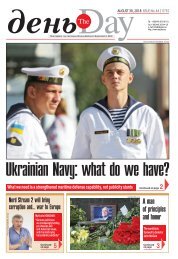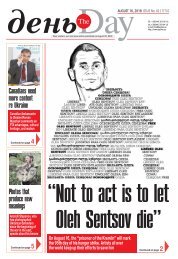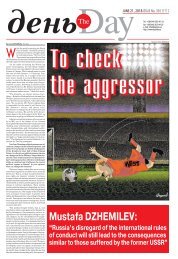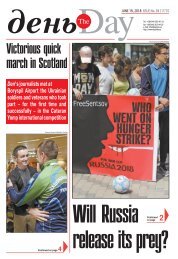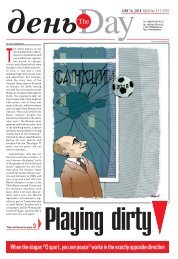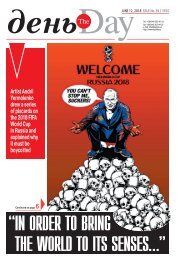#43_1-8
Create successful ePaper yourself
Turn your PDF publications into a flip-book with our unique Google optimized e-Paper software.
6<br />
No.43 AUGUST 23, 2018<br />
NB!<br />
WWW.DAY.KIEV.UA<br />
Russia after the Sea of Azov<br />
Russian naval vessels deployed<br />
increasingly, bankrupting seaports<br />
REUTERS photo<br />
By Andrii MURAVSKYI<br />
After finishing the construction<br />
of the Crimean/Kerch Bridge,<br />
Russia proceeded with a proxy<br />
blockade of the Sea of Azov and<br />
its ports. The bridge does not<br />
allow large ships to pass through<br />
anymore. According to June 2018<br />
statistics, over 144 container ships<br />
stopped visiting the seaports of Mariupol<br />
and Berdiansk, unable to pass under the<br />
bridge. There are also raids by Russia’s<br />
FSB and Coast Guard gunboats that stop<br />
ships en route to Ukrainian seaports.<br />
For more than three months, Russia’s<br />
Coast Guard ships have been meticulously<br />
inspecting vessels headed for<br />
Azov seaports or on the way back. One<br />
might say that their inspections were too<br />
meticulous, forcing the ships under inspection<br />
to waste dozens of hours, which<br />
costs shipowners large sums.<br />
Andrii KLYMENKO, Chairman of<br />
the Board, Foreign Affair Maidan Foundation,<br />
said: “First, these ships have to<br />
wait for permission to pass under the<br />
Kerch Bridge and reach the Sea of Azov.<br />
All have to wait to let an Azov-Black Sea<br />
convoy pass [for example]. When on the<br />
Sea of Azov, any vessel en route to a seaport<br />
or on the way back can be stopped<br />
[and inspected] by a [Russian] Coast<br />
Guard gunboat.”<br />
Such inspections are taking increasingly<br />
longer periods. According to<br />
Mr. Klymenko, in July, they averaged<br />
from two to four hours, then increased to<br />
almost 33 hours toward the end of the<br />
month. The worst delay on record is<br />
55 hours. It involved 62 8-15-ton vessels<br />
en route to Azov seaports. The cost of<br />
24 hours of delay is 4-5 thousand USD.<br />
This discourages the shipowners and<br />
they can’t blame the consignor. When<br />
their ships are idle en route, they must absorb<br />
the full costs of untimely deliveries.<br />
Russia explained that all this was<br />
part of their security precautions while<br />
conducting naval exercises. They promised<br />
that this would stop before the fall.<br />
There are other explanations, however,<br />
including the possibility that Russia<br />
is doing this in response to Ukraine arresting<br />
the Russian dredger ship Nord<br />
registered in Crimea (March 25). Ukraine<br />
now has only two seaports, Mariupol<br />
and Berdiansk, on the Sea of Azov, and<br />
the Black Sea ports of Odesa,<br />
Chornomorskyi, Yuzhnyi, Ochakivskyi,<br />
and Skadovskyi, including the ones in<br />
Kherson and Mykolaiv which have access<br />
to the Black Sea through channels.<br />
The problem is that moving shipments<br />
from Azov to the Black Sea means<br />
that you’ll have to add a couple of bucks<br />
per ton of cargo, damaging the manufacturer’s<br />
reputation. However, the costly<br />
option is on the agenda. There is also<br />
the Ilyich Metallurgical Complex of Mariupol<br />
[“Ilyich” – from “Vladimir Ilyich<br />
Lenin.” – Ed.], now part of Metinvest<br />
Holding Co. They had to move cast iron<br />
shipments to Black Sea ports.<br />
Logistics actually remain the same,<br />
considering that the shipowners appear<br />
prepared to bear additional costs, without<br />
increasing freight rates, lest they lose<br />
regular customers, in view of the market<br />
competition. Some also see the sanctions<br />
imposed on Russia as temporary.<br />
They believe that the situation may well<br />
change “for the better” this fall. Even so,<br />
there are no guarantees that this “truce”<br />
will last long, just as there is no telling<br />
what Russia will do next. Business requires<br />
stability and each shipowner must<br />
be sure when it’s profitable to take the<br />
next cargo.<br />
Volodymyr OMELIAN, Minister of<br />
Infrastructure of Ukraine, feels sure<br />
that Russia is trying to rock the boat in<br />
the Azov region: “We’re in contact with<br />
our partners, working out measures to<br />
help impose similar sanctions on the<br />
Black Sea ports that are currently under<br />
Russia’s control.”<br />
The Ukrainian Seaport Oversight<br />
Administration is keeping track of all<br />
ships stopped and inspected by Russia,<br />
and relays the data to the Ministry of Infrastructure<br />
and the Ministry of Foreign<br />
Affairs of Ukraine. Official Kyiv has contacted<br />
the OSCE, asking to task the Supervisory<br />
Board with keeping track of<br />
Russia’s wrongdoings on both terra firma<br />
and within Ukraine’s territorial waters.<br />
Costs are being assessed to file<br />
Photo by Alina KOMAROVA<br />
XIX INTERNATIONAL COMPETITION<br />
PHOTO — - 2017<br />
damage claims vs. Russia in international<br />
courts, including damages caused<br />
by the Crimean/Kerch Bridge, considering<br />
its height that bans passage for<br />
larger vessels.<br />
There are certain aspects to Russia’s<br />
Coast Guard gunboats stopping and inspecting<br />
ships. Officials of the State<br />
Border Guard Service of Ukraine say such<br />
inspections are formally possible under<br />
the 2004 Agreement on the Sea of Azov,<br />
considering that the sea is an inland<br />
body of water and that there are no territorial<br />
waters per se. Ukrainian Coast<br />
Guard ships would be within their right<br />
to stop and inspect ships en route to<br />
Russia’s seaports of Azov, Rostov-on-<br />
Don, etc., but they keep their distance,<br />
apparently careful not to aggravate the<br />
situation.<br />
In view of this, the legal status of the<br />
Sea of Azov has to be revised. There is a<br />
bill filed with the Verkhovna Rada, entitled<br />
“On the Denunciation of the Treaty<br />
on Cooperation in the Usage of the Sea of<br />
Azov and Kerch Strait, signed by Ukraine<br />
and the Russian Federation.”<br />
InterLegal’s partner Artur Nitsevych<br />
says ships can’t be stopped and inspected<br />
while in an international strait, that this<br />
is against international law. Kerch Strait<br />
is subject to full freedom of navigation for<br />
civilian ships and warships of Ukraine and<br />
Russia. Foreign warships are allowed entry<br />
only with the knowledge and consent<br />
of the contracting parties. Experts further<br />
recommend that the shipowners keep<br />
their distance from Lotsman-Krym, the<br />
pilot company currently in Russia-annexed<br />
Crimea, formerly a Ukrainian government-run<br />
company, that provides<br />
most piloting services.<br />
Lawsuits will take time, of course.<br />
Meanwhile, efforts should be taken to<br />
upgrade the Ukrainian Navy. Currently,<br />
it is unable to defend Ukraine’s interests<br />
in the Sea of Azov. A time-consuming<br />
process, but time is money and<br />
it is a matter of national security for<br />
Ukraine.<br />
While they were “dancing” in Austria...<br />
Thoughtful Ukrainians are remembering, mourning, and honoring<br />
the memory of the Austrian Archduke Wilhelm von Habsburg (Vasyl Vyshyvany)<br />
By Valentyn TORBA, The Day<br />
Recently, a banner exhibition<br />
dedicated to the Ukrainian<br />
military figure, politician, and<br />
poet Vasyl Vyshyvany was<br />
opened on the second floor of<br />
the Lviv Regional State Administration<br />
building. “This exhibition is evidence<br />
that we remember Vasyl Vyshyvany,<br />
who was tortured to death by the Soviet<br />
regime. This individual has entered the<br />
history of our people for good.<br />
Being the son of an Italian<br />
duchess and an Austrian admiral,<br />
he consciously chose Ukraine and<br />
the Ukrainian identity for<br />
himself, and sacrificed his youth,<br />
titles, and connections in the<br />
aristocratic circles of Europe for<br />
the sake of Ukraine. As an<br />
independent nation, we owe a lot<br />
to this patriot,” public figure<br />
Marko Simkin said at the opening<br />
of the exhibition.<br />
It was 1948. Wilhelm Franz<br />
von Habsburg-Lothringen, who<br />
was a Ukrainian military figure,<br />
a politician, a poet, an<br />
Austrian archduke of the Habsburg<br />
dynasty, and a colonel of<br />
the Legion of the Ukrainian Sich<br />
Riflemen, died in Lukianivska<br />
Prison, it was said “under unknown<br />
circumstances.” These titles<br />
of his are not important for<br />
every Ukrainian. Some of us<br />
have a quite superficial view of<br />
them. However, the very names<br />
of such “political romantics” as<br />
Vyshyvany are already TITLES<br />
that future generations should<br />
aspire to emulate.<br />
He was born on February 10, 1895,<br />
near the city of Pula in Dalmatia, in the<br />
family estate of his father Archduke<br />
Charles Stephen Habsburg. It was this<br />
branch of the House of Habsburg-Lorraine<br />
that gave the world several Austrian<br />
kings and emperors, including<br />
Franz Josef, who was Wilhelm’s uncle<br />
twice removed. At different times, the<br />
Habsburgs ruled Germany, the Netherlands,<br />
Spain, Bohemia, and Hungary.<br />
No pompous events are held to<br />
honor him now. They do not rename<br />
streets after him or observe anniversaries<br />
of his life events. And it is a<br />
shame... It reflects badly on today’s<br />
power holders and public figures. It<br />
must be remembered that he was a<br />
scion of the ancient European dynasties,<br />
the Habsburgs and the Lorraines.<br />
And he was the only one to come to defend<br />
the Ukrainian idea while having<br />
such exalted ancestry. They often talk<br />
about Europeanness and the European<br />
course nowadays. In our case, there is<br />
plenty of evidence that Ukraine in Europe<br />
is not just a geographical concept.<br />
This concept is mental and historical<br />
too.<br />
Unfortunately, Vyshyvany’s last<br />
abode remains unknown to this day.<br />
The most cynical and revealing fact is<br />
that Vladimir Putin came to Austria,<br />
the country where Vyshyvany was<br />
born, to attend the wedding of that nation’s<br />
head of the Ministry of Foreign<br />
Affairs precisely in recent days. It<br />
seems that Europe was not only silent,<br />
as Oleksandr Oles put it once... It has<br />
also forgotten. It has forgotten the<br />
bitter lessons of what imperialism is.<br />
Den/The Day newspaper has repeatedly<br />
told the story of this historical<br />
figure in our excursions into “forgotten<br />
matters.”<br />
As Larysa Ivshyna, the editor-inchief<br />
of this newspaper, stressed,<br />
“just as thoughtful Ukrainians are remembering,<br />
mourning, and honoring<br />
the memory of the Austrian Archduke<br />
Wilhelm von Habsburg (Vasyl Vyshyvany),<br />
who was killed in an NKVD torture<br />
chamber, his homeland, namely<br />
the glorious city of Vienna, sees a minister<br />
dancing with a man continuing<br />
the “traditions” of that ominous system.<br />
What has happened to you, Austria?”<br />
● “IT WAS A TRAGIC<br />
MILESTONE FOR UKRAINE”<br />
Tetiana OSTASHKO, Candidate<br />
of Historical Sciences:<br />
“I believe we need to do more to<br />
commemorate the figure of Vasyl<br />
Vyshyvany and, in particular, to observe<br />
the tragic anniversary of his<br />
death. He became a Ukrainian and actively<br />
joined the Ukrainian movement.<br />
In our time, some politicians and<br />
journalists have taken the liberty<br />
of not noticing this fact,<br />
which significantly simplifies<br />
and primitivizes the meaning of<br />
the Ukrainian national liberation<br />
movement. Vyshyvany was<br />
abducted in the British zone of<br />
Vienna and taken to the USSR,<br />
where he eventually died in<br />
Lukianivska Prison. It was a<br />
tragic milestone for Ukraine.<br />
And the fact that this anniversary<br />
came to coincide with what<br />
was effectively a celebration of<br />
Putin in Austria is for us a<br />
straightforward hint that we<br />
have to care about our own fate<br />
better. To count on someone’s<br />
support is not worth it. We must<br />
be strong, we must know our<br />
history well. As for Putin’s arrival<br />
in Austria, it can only be<br />
seen as a shameful occasion for<br />
that European country. I believe<br />
that we must study the historical<br />
aspects of our relations with<br />
European countries in a most<br />
thorough manner. They have always<br />
thought of their interests first.<br />
And if we do not articulate our position,<br />
then others will do it for us and<br />
distort our history in the process.<br />
For this very reason, such historical<br />
figures as Vyshyvany offer telling<br />
and inspirational examples for us as<br />
we are shaping our national and state<br />
positions. All these stories improve<br />
our standing, including in the international<br />
arena, where we must become<br />
a compelling presence. When<br />
we do not know it or ignore this<br />
knowledge, the enemy is the only one<br />
to benefit by exploiting our gaps in<br />
historical memory. Nor should we<br />
forget that this is not just about Russia.<br />
Poland has also played a major<br />
role in exerting political and ideological<br />
pressure on Ukraine. Therefore,<br />
I repeat: we need to shape our own<br />
historical position.”


